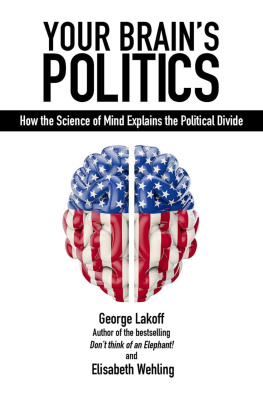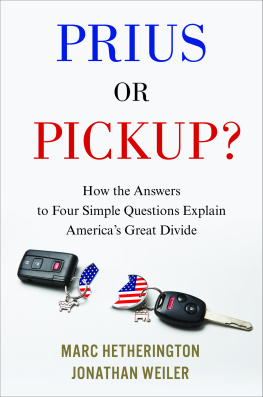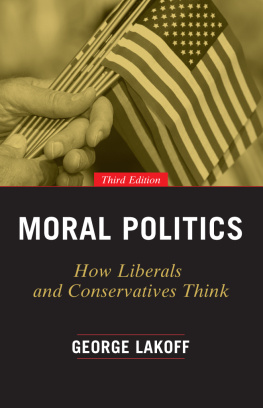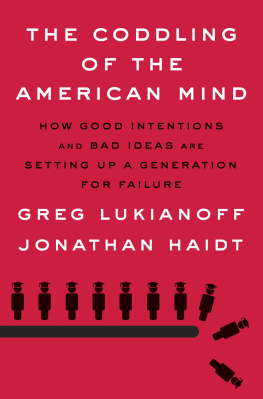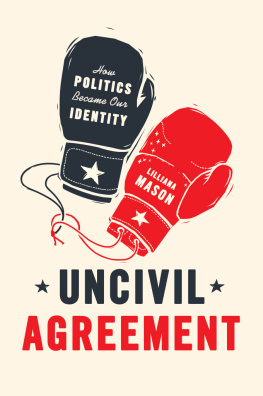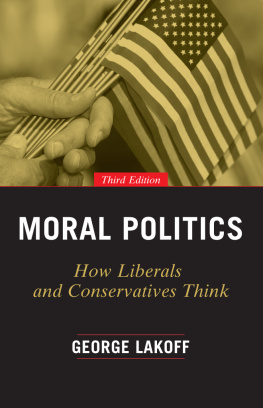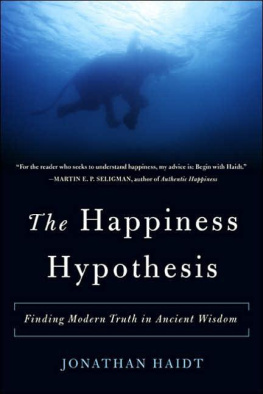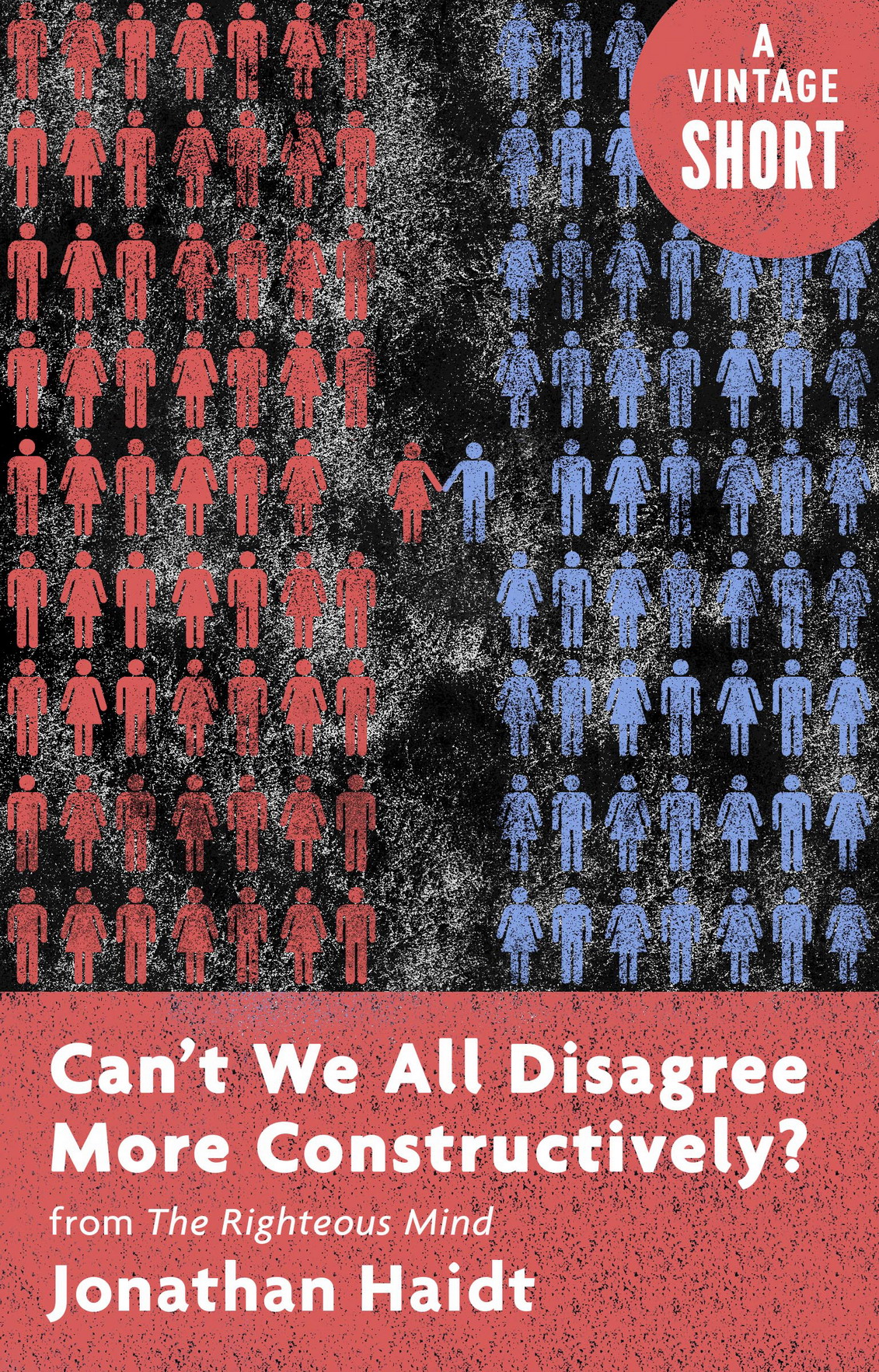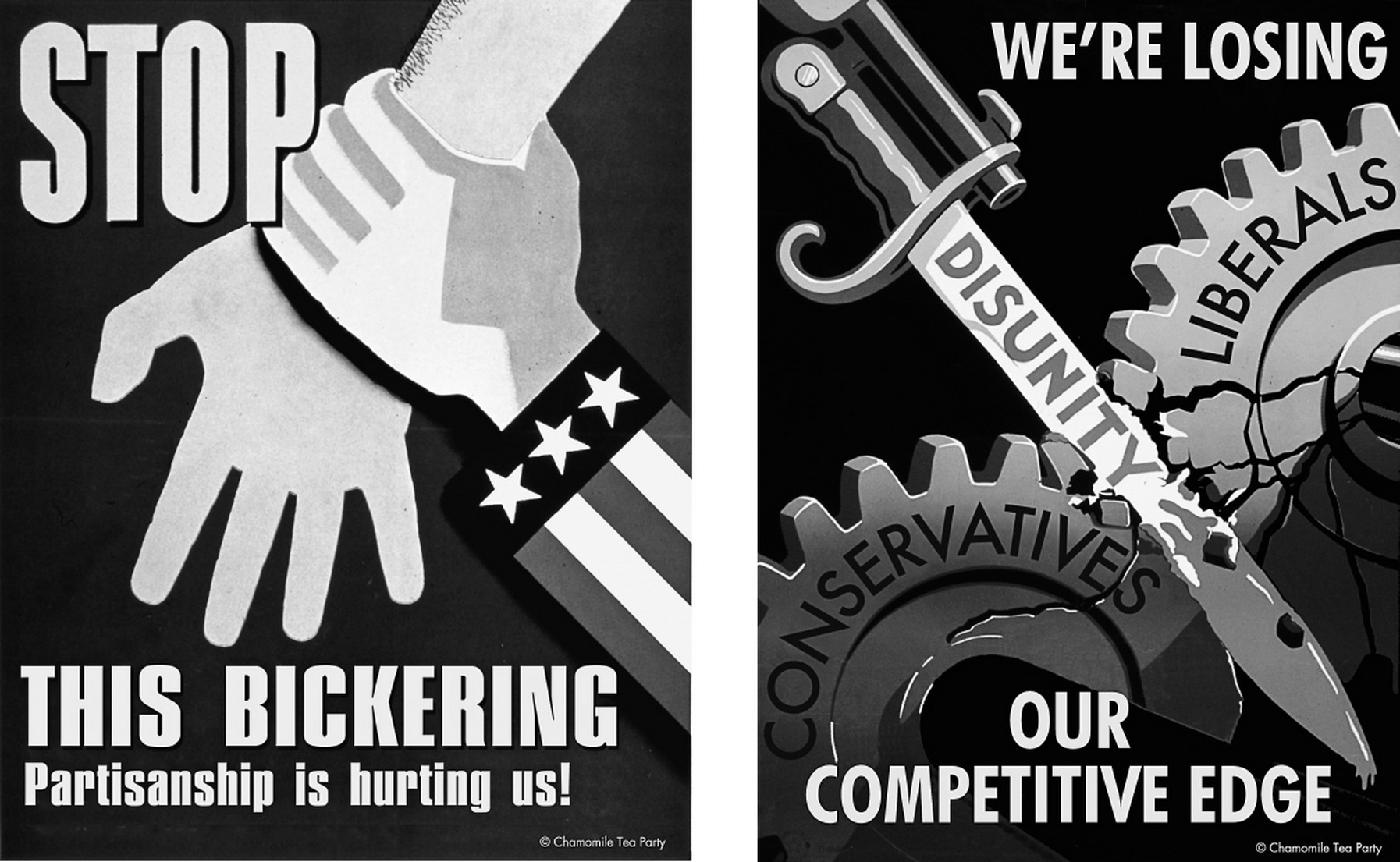Jonathan Haidt
Jonathan Haidt is the Thomas Cooley Professor of Ethical Leadership at New York Universitys Stern School of Business. He obtained his Ph.D. in social psychology from the University of Pennsylvania in 1992, and then taught at the University of Virginia for sixteen years. He is the author of The Happiness Hypothesis: Finding Modern Truth in Ancient Wisdom, and the coeditor of Flourishing: Positive Psychology and the Life Well-Lived. He lives in New York City.
www.JonathanHaidt.com
www.RighteousMind.com
B OOKS BY J ONATHAN H AIDT
The Righteous Mind: Why Good People Are Divided by Politics and Religion
The Happiness Hypothesis: Finding Modern Truth in Ancient Wisdom
Cant We All Disagree More Constructively?
from The Righteous Mind
Jonathan Haidt
A Vintage Short
Vintage Books
A Division of Penguin Random House LLC
New York
Copyright 2012 by Jonathan Haidt
All rights reserved. Published in the United States by Vintage Books, a division of Penguin Random House LLC, New York, and in Canada by Random House of Canada, a division of Penguin Random House Canada Limited, Toronto. Originally published in hardcover as a part of The Righteous Mind in the United States by Pantheon Books, a division of Penguin Random House LLC, in 2012.
Vintage and colophon are registered trademarks of Penguin Random House LLC.
The Cataloging-in-Publication Data for The Righteous Mind is available from the Library of Congress.
Vintage eShort ISBN9780525433781
Series cover design by Perry De La Vega
www.vintagebooks.com
v4.1_r2
a
Contents
Politics aint beanbag, said a Chicago humorist in 1895; its not a game for children. Ever since then the saying has been used to justify the rough-and-tumble nastiness of American politics. Rationalists might dream of a utopian state where policy is made by panels of unbiased experts, but in the real world there seems to be no alternative to a political process in which parties compete to win votes and money. That competition always involves trickery and demagoguery, as politicians play fast and loose with the truth, using their inner press secretaries to portray themselves in the best possible light and their opponents as fools who would lead the country to ruin.
And yet, does it have to be this nasty? A lot of Americans have noticed things getting worse. The country now seems polarized and embattled to the point of dysfunction. They are right. Up until a few years ago, there were some political scientists who claimed that the so-called culture war was limited to Washington, and that Americans had not in fact become more polarized in their attitudes toward most policy issues.
FIGURE 1. Civility now. These posters were created by Jeff Gates, a graphic designer for the Chamomile Tea Party, drawing on American posters from the World War II era. (See www.chamomileteaparty.com. Used with permission.)
But this slight spreading out of the electorate is nothing compared to whats happened in Washington, the media, and the political class more broadly. Things changed in the 1990s, beginning with new rules and new behaviors in Congress.
This shift to a more righteous and tribal mentality was bad enough in the 1990s, a time of peace, prosperity, and balanced budgets. But nowadays, when the fiscal and political situations are so much worse, many Americans feel that theyre on a ship thats sinking, and the crew is too busy fighting with each other to bother plugging the leaks.
In the summer of 2011, the stakes were raised. The failure of the two parties to agree on a routine bill to raise the debt ceiling, and their failure to agree on a grand bargain to reduce the long-term deficit, led a bond rating agency to downgrade Americas credit rating. The downgrade sent stock markets plummeting around the globe and increased the prospects for a double dip recession at homewhich would be a disaster for the many developing nations that export to America. Americas hyperpartisanship is now a threat to the world.
Whats going on here? Psychologists have discovered a lot about the psychological origins of partisanship. Morality binds and blinds, and to understand the mess were in, weve got to understand why some people bind themselves to the liberal team, some to the conservative team, some to other teams or to no team at all.
A NOTE ABOUT POLITICAL DIVERSITY
Im going to focus on what is known about the psychology of liberals and conservativesthe two end points of a one-dimensional scale. Many people resist and resent attempts to reduce ideology to a single dimension. Indeed, one of the great strengths of Moral Foundations Theory is that it gives you six dimensions, allowing for millions of possible combinations of settings. People dont come in just two types. Unfortunately, most research on political psychology has used the left-right dimension with American samples, so in many cases thats all we have to go on. But I should also note that this one dimension is still quite useful. Most people in the United States and in Europe can place themselves somewhere along it (even if most people are somewhat near the middle). so even if relatively few people fit perfectly into the extreme types Im going to describe, understanding the psychology of liberalism and conservatism is vital for understanding a problem that threatens the entire world.
FROM GENES TO MORAL MATRICES
Heres a simple definition of ideology: A set of beliefs about the proper order of society and how it can be achieved. And heres the most basic of all ideological questions: Preserve the present order, or change it? At the French Assembly of 1789, the delegates who favored preservation sat on the right side of the chamber, while those who favored change sat on the left. The terms right and left have stood for conservatism and liberalism ever since.
Political theorists since Marx had long assumed that people chose ideologies to further their self-interest. The rich and powerful want to preserve and conserve; the peasants and workers want to change things (or at least they would if their consciousness could be raised and they could see their self-interest properly, said the Marxists). But even though social class may once have been a good predictor of ideology, that link has been largely broken in modern times, when the rich go both ways (industrialists mostly right, tech billionaires mostly left) and so do the poor (rural poor mostly right, urban poor mostly left). And when political scientists looked into it, they found that self-interest does a remarkably poor job of predicting political attitudes.
So for most of the late twentieth century, political scientists embraced blank-slate theories in which people soaked up the ideology of their parents or the TV programs they watched.
But then came the studies of twins. In the 1980s, when scientists began analyzing large databases that allowed them to compare identical twins (who share all of their genes, plus, usually, their prenatal and childhood environments) to same-sex fraternal twins (who share half of their genes, plus their prenatal and childhood environments), they found that the identical twins were more similar on just about everything.



